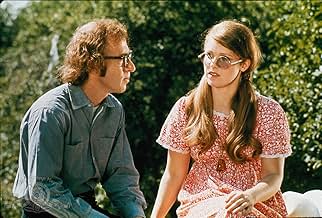Bananas
- 1971
- Tous publics
- 1h 22min
NOTE IMDb
6,9/10
39 k
MA NOTE
Largué par sa petite amie militante, un New-Yorkais maladroit se rend dans une minuscule nation latino-américaine et s'implique dans sa dernière rébellion.Largué par sa petite amie militante, un New-Yorkais maladroit se rend dans une minuscule nation latino-américaine et s'implique dans sa dernière rébellion.Largué par sa petite amie militante, un New-Yorkais maladroit se rend dans une minuscule nation latino-américaine et s'implique dans sa dernière rébellion.
- Récompenses
- 2 nominations au total
Nati Abascal
- Yolanda
- (as Natividad Abascal)
Miguel Ángel Suárez
- Luis
- (as Miguel Suarez)
René Enríquez
- Diaz
- (as Rene Enríquez)
Tigre Pérez
- Perez
- (as Tigre Perez)
Histoire
Le saviez-vous
- AnecdotesSylvester Stallone appears uncredited as a subway thug. This was one of his earliest film roles, not a cameo. According to website Every Woody Allen Movie, "Allen initially sent Stallone back to the casting agency after deciding he wasn't 'tough-looking' enough. Stallone pleaded with him and eventually convinced him to change his mind".
- GaffesWhen Mellish accidentally injects everyone with sodium pentothal during an abduction on a street in San Marcos, there is a blue station wagon parked in front of them with a New York State license plate.
- Citations
Nancy: You're immature, Fielding.
Fielding Mellish: [whining] How am I immature?
Nancy: Well, emotionally, sexually, and intellectually.
Fielding Mellish: Yeah, but what other ways?
- Crédits fousIn the opening credits, the credits flash in time to the music. Additionally, the cards are shot with machine gun fire.
- ConnexionsFeatured in The Dick Cavett Show: Woody Allen (1971)
- Bandes originalesQuiero La Noche
Words and music by Marvin Hamlisch
Sung by The Yomo Toro Trio
[Played during the opening titles and credits]
Commentaire à la une
When asked why he titled his third feature-length picture 'Bananas,' Woody Allen replied, "because there's no bananas in it." This, in a nutshell, pretty much summarises the general tone of the film. During the first ten years of his directing career, it's interesting to see Allen slowly developing his craft; as the years go by, from 'Take the Money and Run (1969)' to 'Sleeper (1973),' {and culminating in 'Annie Hall (1977)'} we notice how he learned to assimilate an unrelated collection of gags into a mature, cohesive narrative. 'Bananas (1971)' sits somewhere in the middle of all this, with a more developed story than its predecessors, but maintaining its roots as an anarchic comedy, much in the same vein as films like 'Duck Soup (1933)' and 'Monty Python and the Holy Grail (1975).' Though I had not anticipated enjoying 'Bananas' very much, I must say that the film provided countless moments of immeasurable hilarity. Though slightly uneven in parts {as is often the case, some jokes hit while others miss}, the film delivers the promised laughs.
The storyline is characteristically simple and absurd. After a revolution breaks out in the small South American nation of San Marcos, a mediocre, unintellectual New Yorker, Fielding Mellish (Allen), travels there to impress his ex-girlfriend (Louise Lasser). After the fascist government tries to have him assassinated, poor Fielding falls in with the rebel gangs, somehow eventually becoming the President of the Latin American republic. This absurd plot line allows Allen to pile one gag on top of another, and, interestingly, the story itself never seems to lose its way or go off on any tangents. The film's satirical take on war, with the Vietnam War still raging in 1971, was very timely, and Allen also aims a few jabs at the media's handling of warfare in the ridiculous and inspired opening, ABC's Wide World of Sports arrives in San Marcos to commentate the assassination of the current President. Later, Howard Cosell returns to host the consummation of Fielding's marriage, with an enthusiastic crowd watching the awkward couple tussling beneath the covers. 'Bananas' is a type specimen of one of Woody Allen's "early, funny movies."
The storyline is characteristically simple and absurd. After a revolution breaks out in the small South American nation of San Marcos, a mediocre, unintellectual New Yorker, Fielding Mellish (Allen), travels there to impress his ex-girlfriend (Louise Lasser). After the fascist government tries to have him assassinated, poor Fielding falls in with the rebel gangs, somehow eventually becoming the President of the Latin American republic. This absurd plot line allows Allen to pile one gag on top of another, and, interestingly, the story itself never seems to lose its way or go off on any tangents. The film's satirical take on war, with the Vietnam War still raging in 1971, was very timely, and Allen also aims a few jabs at the media's handling of warfare in the ridiculous and inspired opening, ABC's Wide World of Sports arrives in San Marcos to commentate the assassination of the current President. Later, Howard Cosell returns to host the consummation of Fielding's marriage, with an enthusiastic crowd watching the awkward couple tussling beneath the covers. 'Bananas' is a type specimen of one of Woody Allen's "early, funny movies."
Meilleurs choix
Connectez-vous pour évaluer et suivre la liste de favoris afin de recevoir des recommandations personnalisées
- How long is Bananas?Alimenté par Alexa
Détails
Box-office
- Budget
- 2 000 000 $US (estimé)
- Montant brut mondial
- 136 200 $US
Contribuer à cette page
Suggérer une modification ou ajouter du contenu manquant




















